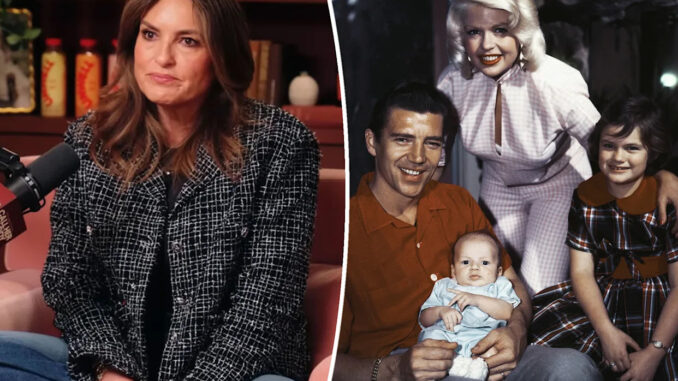
There You Are: How Mariska Hargitay Sought Out the Truth Behind Her Bombshell Mom
The name Jayne Mansfield conjures an immediate, potent image: a blonde supernova, a dazzling, almost cartoonish embodiment of 1950s Hollywood glamour, known for her bombshell physique, her pink palace, and her tragically abbreviated life. But for Mariska Hargitay, that name was more than a cultural icon; it was a ghost in the family attic, a whisper where a shout once echoed, and the source of a profound, lifelong quest. Mariska, herself a titan of the screen, spent decades navigating the long, complicated shadow of her "bombshell mom," not just to understand the woman the world adored and sensationalized, but to find the truth of the mother she barely knew, and in doing so, to finally find herself.
Mariska’s journey began with an absence, a gaping void at the very heart of her identity. At a mere three years old, she was in the backseat of the car when Jayne Mansfield's life was violently cut short in a horrific accident. Her earliest memories were not of a mother’s embrace, but of the fragmented echoes of tragedy, the public’s morbid fascination, and the palpable silence that settled around her and her siblings. Raised by her father, Mickey Hargitay, and his subsequent wife, Ellen, Mariska grew up surrounded by the idea of Jayne Mansfield – the headlines, the films, the larger-than-life persona – but starved of the intimate, personal reality. The woman who bore her was an enigma, a beautiful, tragic legend, rather than a warm, breathing presence. This dichotomy created a powerful impetus: to reconcile the public myth with the private woman, to bridge the chasm between what the world knew and what her own heart yearned to understand.
Her quest wasn't a sudden revelation but a gradual, painstaking excavation, much like an archaeologist sifting through layers of history. As Mariska carved out her own formidable career, first as a struggling actress and then as the indomitable Olivia Benson on Law & Order: SVU, the desire to know Jayne intensified. It wasn't enough to simply inherit the good looks or the spotlight; she needed to understand the source, the foundation from which she sprang. She sought out those who knew Jayne intimately: her siblings, family friends, former colleagues, even ex-husbands. Each conversation was a brushstroke on an evolving portrait, adding color, depth, and nuance to a figure often reduced to a two-dimensional caricature. She devoured Jayne's films, not just as entertainment, but as glimpses into her mother's essence, searching for the sparkle in her eyes, the vulnerability behind the bravado. She read letters, pored over photographs, piecing together a mosaic of a woman who was more than just a blonde bombshell.
What Mariska began to uncover was not a single, shocking secret, but a tapestry of humanity. She discovered a woman of fierce ambition and intelligence, a classically trained violinist, a passionate and loving mother who adored her children. She found a woman who, despite her outward flamboyance, harbored insecurities, faced professional frustrations, and navigated a demanding, often exploitative industry. This wasn't the airbrushed perfection of Hollywood, nor the sensationalized tragedy of tabloid fodder. This was a complex, flawed, vibrant human being. Through these revelations, Mariska began to see her mother not as a distant, unattainable star, but as a kindred spirit, a woman whose dreams and struggles echoed her own.
The culmination of this quest was a profound sense of connection, a moment or series of moments where, across the decades, Mariska could finally look at the image of Jayne Mansfield and say, "There you are." It was the recognition of her mother’s laughter in her own, her mother’s drive in her own ambition, her mother’s fierce protectiveness in her own approach to motherhood. This wasn't a physical reunion, but an emotional and spiritual one, transforming a ghost of memory into a living, breathing ancestor. Understanding Jayne allowed Mariska to embrace her own identity more fully, to no longer be defined solely by the tragedy but by the rich, vibrant legacy of her mother's life.
In the end, Mariska Hargitay's pursuit of truth behind her bombshell mom was more than just solving a family mystery; it was an act of profound self-discovery and healing. By diligently seeking out and stitching together the fragments of Jayne Mansfield's life, she didn't just understand her mother; she gave her mother back her humanity. And in doing so, Mariska found peace, a fuller sense of self, and the enduring power of a daughter’s love to bridge the vast divide between myth and reality, absence and presence. "There you are," she found herself saying, not just to Jayne, but to a deeper, more complete version of herself.
